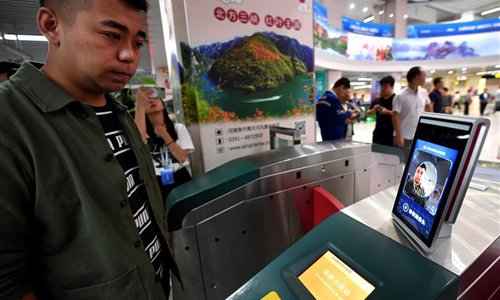Hangzhou safari park goes to court in China’s first facial recognition-related litigation
By Huang Ge and Xu Keyue Source:Global Times Published: 2019/11/3 15:08:39

A man passes the ticket gate through facial recognition payment system at Zijingshan subway station in Zhengzhou, central China's Henan Province, Sept. 27, 2019. A facial recognition payment system was put into use in the Line 1 and the first phase of Line 14 of Zhengzhou Subway on Friday. (Xinhua/Li Jianan)
A professor in East China's Zhejiang Province sued a safari park for compulsorily collecting biological information after the park upgraded its system to use facial recognition for admission.
The case is the first of its kind in China amid increasing concerns over indiscriminate use of facial recognition technology.
Guo Bing, a law professor at Zhejiang Sci-Tech University, believes Hangzhou Safari Park had violated China's consumer protection law by compulsorily collecting individual facial characteristics of visitors, The Beijing News reported.
The Fuyang district court in Hangzhou, capital of Zhejiang Province, accepted the case on Friday.
According to the report, Guo spent 1,360 yuan ($193) on a Hangzhou Safari Park annual admission card on April 27. The card offers unlimited admissions and requires the card and visitors' fingerprints for verification when they enter the park.
However, a message from the park on October 17 read "the admission system has been upgraded and the fingerprint system will not be available. Visitors who are not registered in the facial recognition system can no longer enter the park."
An employee with the park confirmed with the Global Times on Sunday "the park has canceled the fingerprint admission system and required visitors to register with facial information."
"Facial recognition is fast and convenient, and sometimes visitors' fingerprints cannot be recognized when the finger is frayed," the employee who chose to remain anonymous said.
According to Guo, facial features are sensitive personal information and can jeopardize consumers' safety if leaked.
According to article 29 of China's consumer protection law, when collecting and using personal information of consumers, business operators should abide by the principles of legality, legitimacy and necessity, clearly indicate the purpose, method and scope of the collection and use of information, and obtain the consent of consumers.
Guo said that the park tried to collect his personal biometric information compulsorily by upgrading the annual card system, which heavily violates related rules of the consumer protection law.
In the lawsuit, Guo demanded the park to refund the card fee of 1,360 yuan and bear the litigation cost.
It is "reasonable and necessary" for police to use the technology, an employee at a Shenzhen-based artificial intelligence (AI) technology company, who requested anonymity, told the Global Times on Sunday, "but business operators cannot force such a facial collection of customer information."
Technology providers claim that technology strengthens security and improves efficiency, the employee said, "but technical barriers decide that customer privacy is not 100 percent guaranteed."
Park and business operators alike should be cautious about using AI, he said.
Newspaper headline: Safari park in court over use of facial recognition